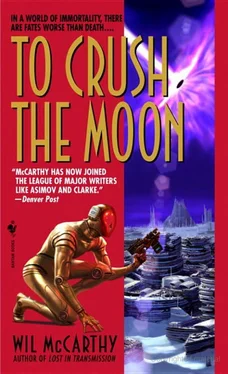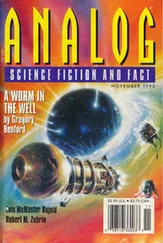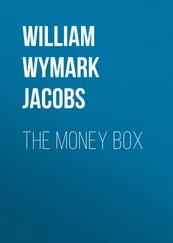“Is this place serviced by tankers, then?” Mursk asked.
“Rarely. I’ve designed a tertiary system which is capable of bleeding mass from the neubles at the planette’s core.”
“Hmm. Clever.” They passed from the cottage’s grassy meadow into the green gloom of the forest itself.
“Lad, I want you to level with me. No sweeteners, no half-truths. You fled the Barnard colony with guns blazing, in the midst of what proved to be a total collapse. What happened?”
“A disagreement.”
“With Bascal?”
“Aye, with Bascal. Who else? He was in charge, Sire. Of everything.” Now Mursk was angry.
“Gently,” Bruno said, fearing he might not get an answer at all if he pressed too hard, or in the wrong way. “It’s all in the past, and I’ll not prosecute misdeeds which took place outside my dear wife’s jurisdiction. You understand? The chips have fallen; the cards are on the table, and I call. I just want to know.”
Behind them, the sun set through the branches and canopy of the forest. On the world’s other side—currently its night side—it was the crickets, not the birds, that chirped. Such was life on a planette: you could walk to any time of day you liked.
“People were dying,” Mursk said. His tone begged no forgiveness, offered no apology. “Your son’s plans were rational, but they weren’t humane.”
“And yours were,” Bruno said.
“Aye. But not rational. And not loyal. Your son put his faith in me, and I betrayed him.”
Bruno could hear the pain in Mursk’s voice, and he supposed it was all true; this man did love Bascal Edward de Towaji Lutui. As a friend, as a brother. As a traitor—squirming under the bootheel of oppression—loves his country and his people. Bascal had always been, in his father’s sad opinion, more a user than a developer.
“Sometimes opposition is loyalty,” he offered, though it must be cold comfort indeed.
“Maybe. You should know, Sire, that there’s a partial copy of Bascal in Newhope ’s comm archives. Not a whole person by any means, but a valid memory nonetheless. I promised him that when we got here, I’d transmit it back to Barnard.”
“Promised him? Even after he tried to erase you from the colonial sky? My goodness. Lad, the worst evil is the kind we feel fondly toward. I understand your reluctance to condemn him, truly. But you must be honest with yourself, and with me. Do you know who my best friend was?”
“Marlon Sykes,” Mursk answered, for every schoolchild knew this.
“Correct,” Bruno said. “And as you say, we fought as only brothers of the spirit can fight. With absolute conviction, with love and honor and hatred. To the death.” And even after all these centuries, the wound still felt fresh, still brought an angry mist to Bruno’s eyes. Rational and inhumane, indeed! Marlon had been a brilliant creator as well as a villain, and if the two traits could have been separated somehow, then perhaps Bruno might not have pulled that switch, and sent his friend packing in a cage de fin , on a one-way journey to the end of time. But the damage that hidden monster had caused—the sheer scale of it—boggled even Bruno’s imagination. Some offenses simply overflowed the dams and levees of any possible compassion.
“That must be quite a load for you to carry, Sire,” Mursk said to him, as starlight broke through the trees.
“Quite,” Bruno agreed. And they finished the walk in silence.
“I don’t know anything about wormholes,” Mursk admitted. “You’re making them? Here?”
Seated once more in his comfortable study, Bruno spread his hands. “Trying to, yes.”
Sensing an appropriate moment, Hugo appeared with a pipe and lighter, which Bruno accepted gratefully.
“Thanks, old thing.”
“You’re entirely welcome,” Hugo answered, sounding truly pleased with himself, albeit that stale, arithmetic sort of pleasure to which emancipated robots were given. “May I walk around the yard a bit?”
“You’re supposed to do as you please, my friend.”
“It pleases me to serve,” Hugo said, and wandered off.
With the ease of much practice, Bruno ignited the home-grown, home-cured weeds in the pipe’s ceramic bowl, and drew a puff of their smoke into his mouth. The natural drugs involved, passing through the tissues of his cheeks and into his bloodstream, were mild and crude and beside the point. It was the anachronism of the act itself that Bruno savored; the loops and whorls of rising smoke connected him to Einstein, to Edison, to all the great thinkers of the Mortal Age, of whom he was the last. Connecting him, indeed, to the fireside musings of primal humanity itself.
“What are they for?” Mursk asked. “You intend these wormholes as a substitute for fax gates?”
“Ideally, yes. There may yet be time to prop up these failing colonies, if I can just—”
“Make it work?”
Bruno laughed around the stem of his pipe. “Yes, make it work. Clever lad. Alas, I fear I’m not up to the task. These old chalkboards are getting white.”
“Eh?”
“Chalkboards. Blackboards. Ah, what do you children know?” The cloud around him thickened with his huffing, and he waved it away. “In the tradition-heavy wilds of Catalonia, where I cut my first set of teeth, the last vestiges of the stone age lingered very nearly until the rise of the Queendom. A chalkboard was a slab of hard, dark slate onto which you would scribble with little cylinders of soft, white chalk. Really! We had one in every classroom, every kitchen. You’d erase the board with a rag, you see, and write in a new batch of lessons or chores or ingredients. But sometimes you’d misplace the rag, and you’d have to scribble around the margins of what you’d already written. If you let this go on long enough, eventually the board would get so white with scribbles that you couldn’t read it anymore. And so we learned: too much knowledge is as bad as none at all. We forget how to forget. But this lesson itself seems to have fallen from our collective memory. Our civilization grows too brilliant to brush its own teeth.
“At any rate, yes, I’m battering my head against this problem, and what progress I’ve made has been more tantalizing than helpful.” Bruno didn’t generally present his works-in-progress—too embarrassing—but in a sudden fit of hospitality he added, “I can show you, if you like.”
“Sure,” Mursk said, shrugging. “It sounds kind of fundamental to our future.”
This irritated Bruno. The lad meant well enough, surely, but a king could grow very tired of his people’s unreasonable expectations. “Only if luck is on our side, lad. The universe is under no obligation to please our petty whims, and I have failed many times to throw a harness round its neck.”
The trick with a pipe was not to puff on it too much, lest its smoke turn sharp and acrid—or too little, lest it fade to the dull flavor of ashes. But Hugo was back again, this time with Bruno’s ashtray, which he whisked onto the desk in front of him before dancing back out of the study again with too-quick, too-perfect fluidity.
“Nice robot,” Mursk said, with less than total conviction.
“He saved my life once, in battle. He’s quite brave.” Bruno set the pipe down in the ashtray and began tapping at his desktop controls. “Now, the first trick in wormhole dynamics is to develop your standing gravity wave very, very rapidly. It’s not at all like collapsing a neuble into a black hole. Second, you’ve got to dump in twice as much power as theory predicts you ought to. I’m still figuring that one out.”
While he spoke, the writing vanished from every surface, zipping into archive space. Glittering green-black bullseyes took their place on two opposite walls. The lights dimmed, and though it wasn’t apparent from here in the windowless study, the sun itself dimmed as well, focusing fully eighty percent of its output in a single strand of violet laser. Bruno’s eastern photovoltaic array, hidden away in a forest glade, took the beam head-on and fed its power directly into the gravity lasers. The air in the study began to shudder, then to twirl itself into fist-sized eddies that popped and lashed their way around the room.
Читать дальше












